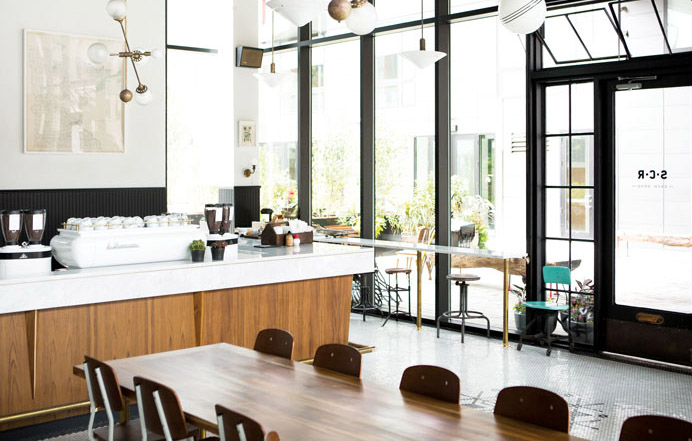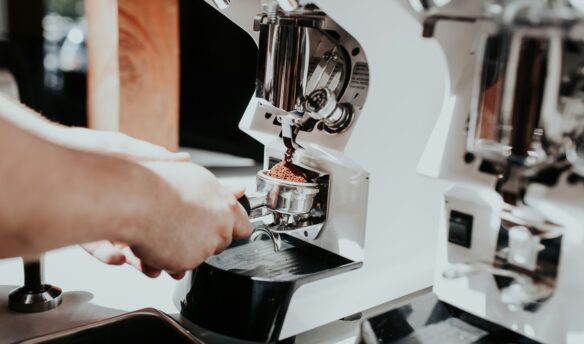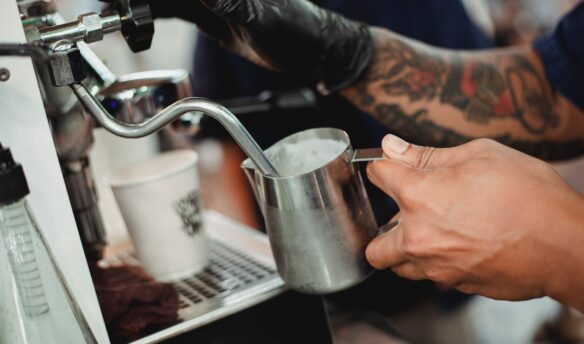[I]t’s not hard to see why Spyhouse Coffee Roaster’s newest café, situated in Minneapolis’s North Loop design district, has been packed since the day the doors opened. Walking into the space, you’re struck by the old-school glamor of the interior, a mash-up of art deco and turn-of-the century design with a little mid-century modern mixed in. Antique light fixtures hang from a black tin ceiling, casting their glow over schoolhouse chairs. Vintage stools rest on a custom-tiled floor inlaid with the Spyhouse logo. The coffee bar stands behind a marble counter seamed with a brass foot rest, and an antique mirror—which doubles as the menu—reflects a broad image of the bustling café.
When Spyhouse owner Christian Johnson walked into the space a year ago, though, it was just an empty cinder block room in a brand new building. “With each space, I get to try out new design elements I’m interested in,” Johnson says of each of his four Spyhouse cafés. A devoted antiques collector and design enthusiast, he points out the chevron pattern in the wooden ceiling frame, a rounded exit sign glowing by the entrance, and an old door embedded in a wall imprinted with “Hall Safe & Locks,” which was part of a safe from the site’s original building. Johnson’s zeal for design and detail is infectious and carries over into every aspect of the business.
When Johnson points out that the espresso drinks are served in Italian porcelain cups, printed with the state of Minnesota in silhouette, and that the tables have special flanges so they won’t wobble, you begin to understand that your experience is completely curated. And that’s not a bad thing. Especially, when you consider the coffee.

Spyhouse became a farm-to-cup operation in 2013 when they opened their roasting facility and café in the Northeast Minneapolis arts district in a refurbished factory. “We wanted more control over our coffee,” Johnson says. He and his team established relationships with farmers in Costa Rica, Guatemala, Kenya, Ethiopia, Brazil, and Colombia. They also make annual visits to cooperatives in multiple countries.
“It’s exciting to see the whole progression, how the farmers become our partners,” says Johnson.
Spyhouse offers a tight portfolio of seven to eight coffees at a time. Their careful flavor assessment and coffee sourcing led to a Good Food Award this year for their Ethiopian Suke Quto, a washed Ethiopian with pineapple and jasmine notes. It was grown by Testaye Bekele, whose careful practices are helping to repair land damaged by fire and deforestation.
Beans are roasted at the central facility and café in a refurbished Probat UG, “super sturdy, hardcore, kick-ass machines,” Johnson says appreciatively. When the roasted beans make it to the end of their journey behind the coffee bar, they’re ground in a Mahlkönig EK 43 for filter or Mahlkönig K30 Twin for espresso. Filtered coffee is made in Fetco batch brewers or in Kalita Waves for pour-overs. Espresso shots are pulled on a three-group La Marzocco FB70, the shiny chrome complementing the design of the bar. “I don’t think it gets better than a Fetco drip and an espresso demi ten minutes after it’s brewed,” says Johnson.

That attention to detail has defined the Spyhouse brand since 2000, when Johnson opened the first café on Nicollet Avenue with just seven dollars left in his pocket, a bank loan, and experience as a barista at local café, Caffetto.
“I’m completely independently owned. No investors, just old-school SBA loans,” he says. “It’s all about attention to detail and quality throughout the whole scope of the coffee experience.” Johnson carefully considers all aspect of his shops, citing the importance of the “the water, the equipment, barista training, latte art, sourcing, roasting, brewing, and design.” Everything is carefully considered, including each business decision.
For instance, the decision to limit the food menu to just pastries was made in deference to local sandwich shop C. McGee’s Deli that’s been in business since the 1980s. Though “just pastries” might not do justice to the unique selection of treats from Black Walnut Bakery (think mushroom croissants with béchamel and flaky kouign-amman) baked by a veteran of Tartine in San Francisco and Butcher and the Boar in Minneapolis, Sarah Botcher. Bottled drinks are sourced from Core beverage, a distributor based in the Twin Cities metro. With each product, there’s an emphasis on featuring local, handmade talent.
When I ask what’s next for Spyhouse, Johnson says he’s happy for the moment, but adds he’s thinking about expanding the wholesale operation and maybe opening a shop across the river in St. Paul.
Then, he gets up to point out the stools at the window, all different, telling the story of where he found each. When asked what defines Spyhouse, he answers without hesitation, “One is design and the other is coffee.” Sipping a velvety single-origin at the marble bar while perched on an antique stool, that sounds just about right.
—Kathryn Silverstein is a Minneapolis-based freelance writer.

















